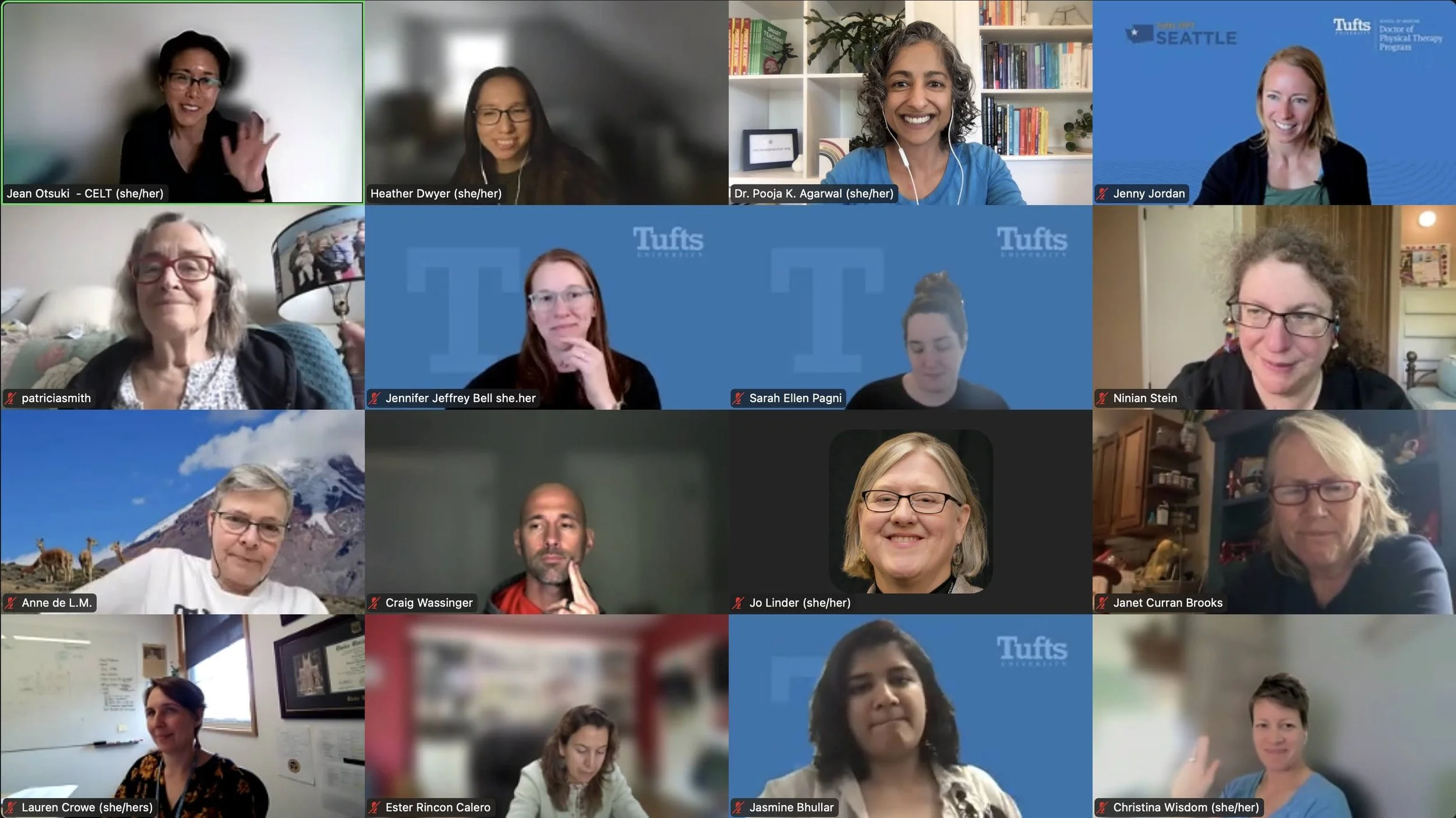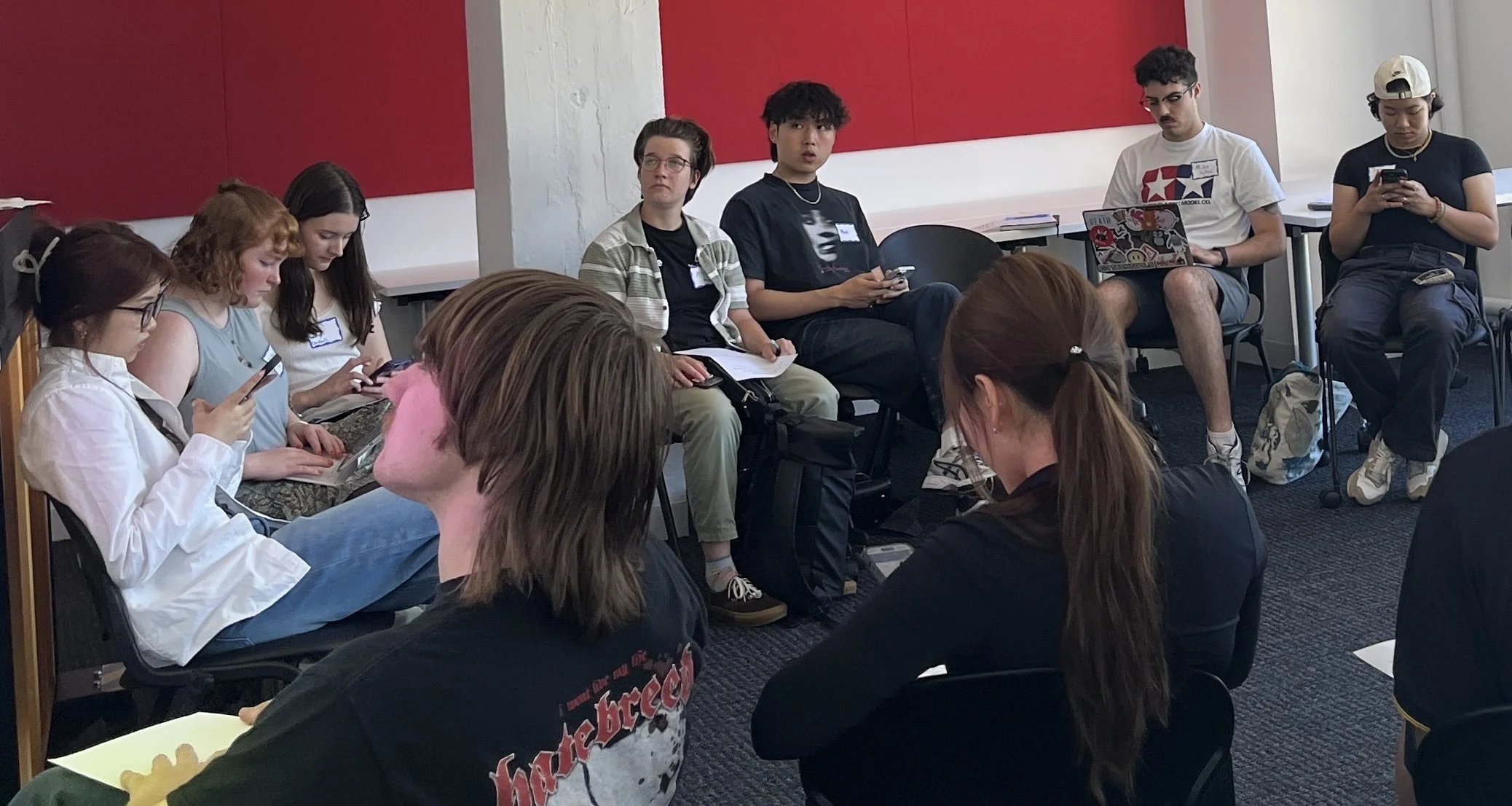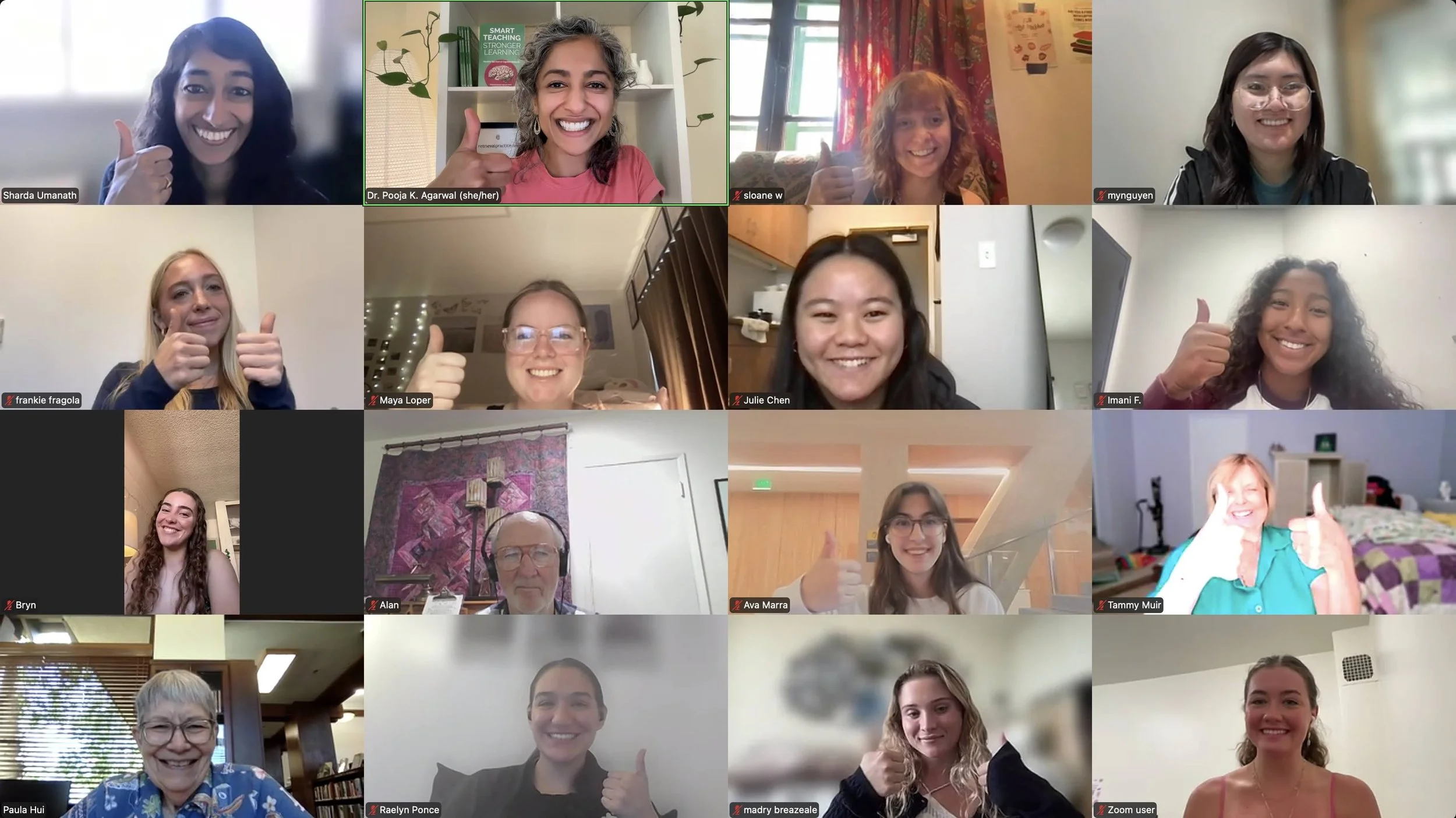Include an "ask me anything" in your class to boost learning and community
/One of my favorite activities when I teach is an “ask me anything” session (AMA). Students ask me questions about content, of course, but a structured AMA is a fantastic opportunity to boost learning and build class community. Importantly, AMAs are not Q&As. With no-tech and low-tech options for all grade levels and class sizes, continue reading for my tips on how to facilitate an AMA during your class.
I recently held a free AMA on Zoom, exclusively for my newsletter subscribers. Make sure to sign up at retrievalpractice.org/subscribe to receive announcements about future events. I also offer virtual and in-person AMAs, keynotes, and workshops with teachers and students around the world. Email me at ask@retrievalpractice.org or complete this Google Form to receive more information.
an AMA with a book club at Tufts University
Learn more about me and ask me anything!
Whether you’re a new subscriber or long-time follower of RetrievalPractice.org, I thought it’s time I (re)introduce myself.
I’m Dr. Pooja Agarwal (she/her, @RetrieveLearn), and I love making teaching and learning memorable. I’m a cognitive scientist, teacher, book author, and speaker. I’ve published 2 books, 20+ academic journal articles, visited hundreds of schools, and taught thousands of students. I’m also an Associate Professor of Psychology at the Berklee College of Music in Boston, where I teach psychology and neuroscience to exceptional musicians.
In addition to my teaching and research, I’m an advocate for diversifying the field of cognitive science and I create free, open access resources for teachers about the science of learning.
Over the 10 years I’ve been sending my newsletter (wow) and the 20 years I’ve been teaching and conducting research (wowza), I’ve received thousands of questions from educators around the world. I teach nearly 90 college students each semester (for those in higher ed, I have a 4/4 course load) and I wish I had more time to write about each question I receive. That’s why I love visiting schools virtually and in person. I love fielding unexpected questions and facilitating thought-provoking discussion on the fly. I always get asked at least one question that stumps me or gives me a new idea to chew on, too.
Some fun facts about me:
For my birthday last week (thank you all for your well wishes), my partner and I went to an agricultural fair. I held a baby chick! I don’t think I’ve done that since I was in 2nd grade (photos above). I was born and raised in Illinois, and I have a lot of nostalgia for local fairs.
My favorite country is Uruguay, my favorite musical artist is Michael Jackson, my favorite book is The Giver, and my favorite movie is the Princess Bride.
I enjoy cooking, tango dancing, and binge watching Netflix. Most recently, I finished watching Monster: The Ed Gein Story. It’s a bit gruesome, but if you like true crime, I’d recommend it.
I hope to see you during my AMA on Zoom or at a future event. Feel free to ask me anything!
How to incorporate AMAs in your classes
My students using Slido for an AMA during class
When I asked my students for mid-semester feedback, I was surprised that they wanted me to include more time for “ask me anything” (AMA, a type of interview format that’s popular on the website Reddit). I have an AMA during the first week of class, but I didn’t realize how much my students enjoy it. Of course, students ask questions during lessons, but I find that an open-ended AMA is an effective way to encourage retrieval practice about course topics, while also fostering engagement and community. I also include an AMA during my professional development keynotes and workshops. I never know what questions I’m going to get, but that’s part of the fun for me, too.
An important distinction: AMAs are not Q&As (question and answer sessions, which are typically about course content). Because I frame the activity as “ask me anything,” my college students feel more comfortable asking clarifying questions about specific course topics and asking about psychology, my career, and my thoughts on the world. I find that my students are respectful in the questions they ask and they understand if there’s a question I choose not to answer. Plus, unlike Q&As, AMAs are anonymous, so students don’t have to raise their hand to ask a question in front of the entire class.
Whether you teach K–12 students, college students, or graduate students, here are my tips for how to incorporate an AMA in your classroom:
Regarding timing, you could answer all the questions at once or answer a few during each class meeting. To calculate the amount of time you need for an AMA, I recommend allowing for 30–60 seconds per question. For example, I answer approximately 20 questions in 15 minutes.
For a no-tech AMA, use index cards: Hand out index cards, have students anonymously write down questions, collect and shuffle the cards, and go through students’ questions. You can invite all students to complete an index card, which provides a nice variety of questions, and you can moderate or rephrase questions if needed. For added retrieval practice, have students retrieve two things on one side of the index card, with their AMA question on the other side.
For an AMA using ed tech apps like Slido or PollEverywhere, you embed a slide into Google Slides or Powerpoint, and students scan a QR code to type in their question anonymously on a website.
In the photo above, my class is using an ed tech app called Slido. I use the free version, which includes the Q&A feature and 3 polls, like open text, a word cloud, and multiple-choice questions. Slido integrates well with Google Slides and it takes literally 10 seconds to add an anonymous Q&A into my slides. One feature I like about Slido is that you can “highlight” or display each individual question full-screen on the projector, increasing accessibility for all students. Slido also has an “upvote” option, which I encourage students to use so that we can prioritize the most popular questions during the AMA. Click here for more ed tech polling tips from the fantastic podcast/blog Teaching in Higher Ed.
Recently, I joined college students at Claremont McKenna College for an AMA via Zoom, in a psychology class taught by my colleague and cognitive scientist Dr. Sharda Umanath. Students asked insightful questions about how to study effectively, how to conduct research in schools, and how to use retrieval practice for lifelong learning. I love speaking with students of all ages, so if you’re interested in hosting an AMA for your school or class, please don’t hesitate to contact me. If you’re in K–12, you should also check out the free resource Skype a Scientist to connect with more scientists around the world.
An AMA with college students at Claremont McKenna College
Here are some questions students asked during the AMAs, which were a lot of fun to ponder:
What are your favorite and least favorite things in psychology?
Who’s your favorite musical artist?
Do you have any advice on how to cope with procrastination?
What is the most random fact you can think of right now?
And here are some questions I discussed during my recent free AMA on Zoom for newsletter subscribers:
How do you approach generative AI in your classroom?
How do you motivate students if retrieval practice is ungraded?
What are your favorite strategies from your books Powerful Teaching and Smart Teaching Stronger Learning?
How do you balance covering course content while also providing time for retrieval practice?
How did you get interested in the science of learning?
What is a finding from your research that surprised you?
What is your favorite “hidden gem” attraction or restaurant in Boston?






















